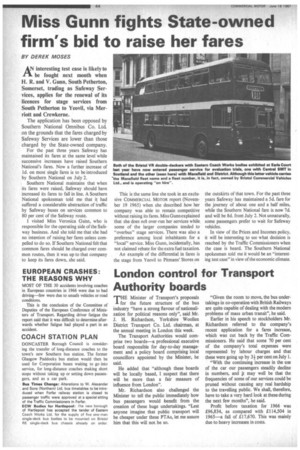London control for Transport Authority boards
Page 46

If you've noticed an error in this article please click here to report it so we can fix it.
THE Minister of Transport's proposals for the future structure of the bus industry "have a strong flavour of nationalization for political reasons only", said Mr. J. H. Richardson, Yorkshire Woollen District Transport Co. Ltd. chairman, at the annual meeting in London this week.
The Transport Authorities would comprise two boards—a professional executive board responsible for day-to-day management and a policy board comprising local councillors appointed by the Minister, he said.
He added that "although these boards will be locally based, I suspect that there will be more than a fair measure of influence from London".
Mr. Richardson also challenged the Minister to tell the public immediately how bus passengers would benefit from the creation of these huge undertakings. "Lest anyone imagine that public transport will be cheaper under these PTAs, let me assure him that this will not, be so. "Given the room to move, the bus undertakings in co-operation with British Railways are quite capable of dealing with the modern problems of mass urban transit", he said.
Earlier in his speech to stockholders Mr. Richardson referred to the company's recent application for a fares increase, which was cut back by the Traffic Commissioners. He said that some 70 per cent of the company's total expenses were represented by labour charges and that these were going up by 31 per cent on July 1.
"With the continuing increase in the use of the car our passengers steadily decline in numbers, and it may well be that the frequencies of some of our services could be pruned without causing any real hardship to the travelling public. We shall, therefore, have to take a very hard look at these during the next few months", he said.
Profit before taxation for 1966 was £96,834, as compared with £114,504 in 1965—a fall of £17,670. This was mainly due to heavy increases in costs.




































































































































